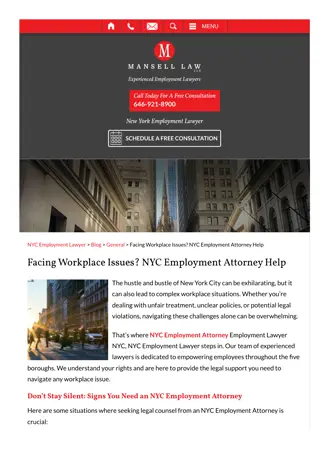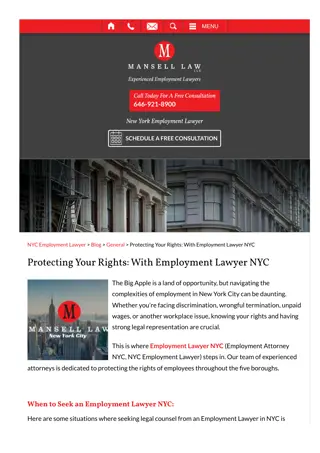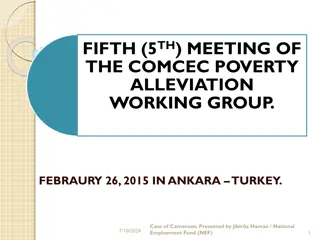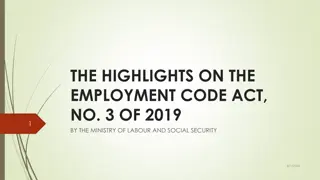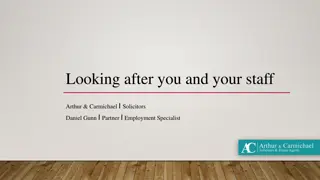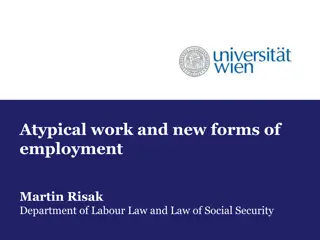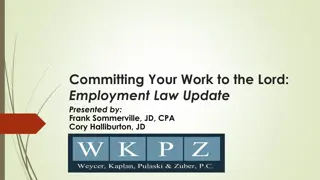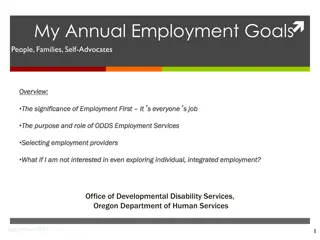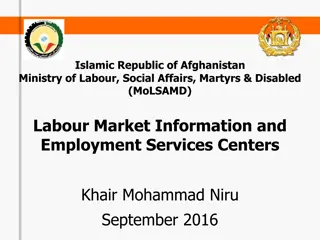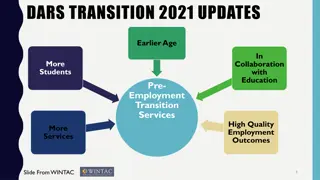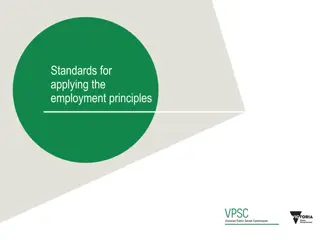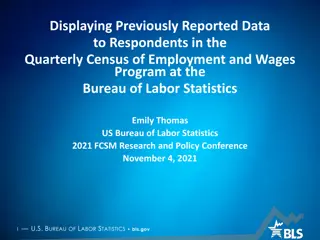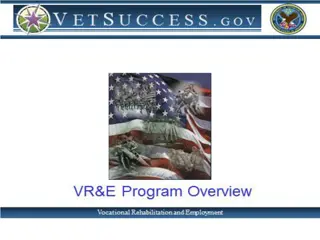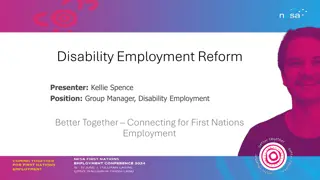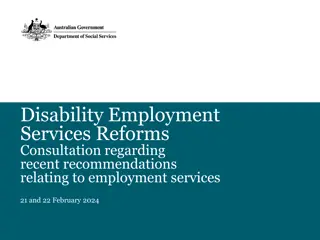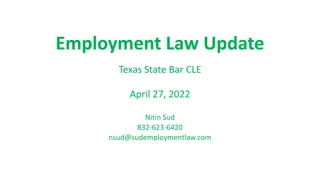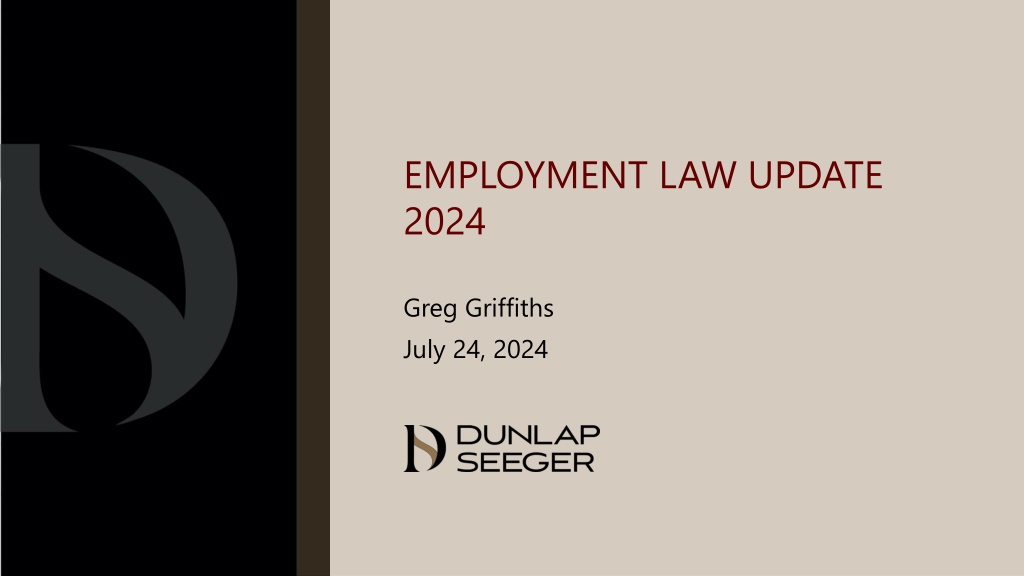
Latest Employment Law Updates and Changes in 2024
Stay informed about the significant changes in employment law for 2024, including the Supreme Court overturning the Chevron rule, updates to the NLRB Joint Employer Rule, changes in overtime protections, and updates to ESST laws in Minnesota.
Download Presentation

Please find below an Image/Link to download the presentation.
The content on the website is provided AS IS for your information and personal use only. It may not be sold, licensed, or shared on other websites without obtaining consent from the author. If you encounter any issues during the download, it is possible that the publisher has removed the file from their server.
You are allowed to download the files provided on this website for personal or commercial use, subject to the condition that they are used lawfully. All files are the property of their respective owners.
The content on the website is provided AS IS for your information and personal use only. It may not be sold, licensed, or shared on other websites without obtaining consent from the author.
E N D
Presentation Transcript
EMPLOYMENT LAW UPDATE 2024 Greg Griffiths July 24, 2024
Supreme Court Overturns Chevron Rule The Chevron rule had been in place for 40 years. It required courts to give deference to Federal Agency decisions. This could be anything from DOL overtime rules, ACA rules, to environmental regulations. This meant that courts would not interfere with agency decisions unless they were clearly wrong. This means courts are more likely to rule against federal agencies. DOL overtime rule FTC ban on non-compete agreements DOL decisions against local employers? It is possible this means fewer federal regulations on employers. This would not impact state laws such as Minnesota s ban on non-compete agreements. 2
2023 NLRB Joint Employer Rule On Friday July 19, the NLRB voluntarily dismissed its appeal of a Texas court ruling striking down the 2023 Joint Employer Rule. This means we are back to the 2020 rule. Under the 2020 rule, an employer could be the joint employer with another entity if it had direct and immediate control over the essential terms of employment. Things like wages, benefits, hours, discipline, supervision etc. Under the 2023 rule, joint employment could exist based on indirect or reserved control. There was concern over how vague this was. Other court challenges are pending so stay tuned. 3
Overtime Rule Restoring and Extending Overtime Protections Starting July 1, 2024, the new DOL rule increased the minimum salary threshold to qualify as exempt from $43,888 annually ($844 per week), up from $35,568 ($684 per week). The minimum for highly compensated employees was raised from $107,432 to $132,964 annually. Starting January 1, 2025, the threshold will increase to $58,656 annually ($1,128 per week) and the annual compensation requirement for highly compensated employees will also increase to $151,164. On July 1, 2027, the threshold will increase again, and there will be another increase every three years. This has already been challenged in court. Will it remain in place? 4
Updates to ESST There were several updates to Minnesota s ESST law, most of which are effective immediately. These updates include: ESST may be used in 15-minute increments, eliminating the prior requirement that employers allow employees to use ESST in the smallest increment of time tracked by the employer s payroll system. Employers can provide employees with details regarding employee s available ESST and amount of ESST used during a pay period electronically (or on the employee s paystub, as before). ESST may now be used for funerals, arrangements of funerals, or time away for financial or legal matters that arise after the death of a family member. 5
Updates to ESST cont. Employees paid on an hourly basis who receive multiple hourly rates must receive ESST at the rate the employee would have been paid for the period in which leave was taken. Employees paid on a salary basis must receive ESST at the same rate had the employee had not taken leave. Employees paid any other way other than hourly, or salary must receive ESST at a rate no less than the applicable minimum wage. If more than one applicable minimum wage, they must receive whichever is greater. As of January 1, 2025, if ESST is part of PTO, the entire PTO bank must comply with the requirements of the ESST statute for example, the documentation, base rate, notice, penalties etc. What does this mean? 6
Paid Family and Medical Leave (PFML) Starting January 1, 2026, full and part time employees get paid family and medical leave. It applies to all employers. Up to twelve weeks for each up to a maximum of 20 weeks. Employers can have it run concurrently with FMLA. It is a partial wage replacement funded by a payroll tax increase split between employers and employees. 7
Paid Family and Medical Leave (PFML) The legislature made the following amendments: Increased the payroll tax from 0.7% to 0.88% (can be split employees). Added or amended certain definitions. Requiring employers to grant minimum increments of one calendar day. Providing an appeal process. Will the payroll tax increase? 8
Misclassifying Employees as Contractors The law now provides for harsher penalties for employers who misclassify employees as contractors. The law also implements a new independent contractor test for those working in the construction industry. The new law prohibits employers from: Failing to report an individual as an employee when required by applicable law; and Requiring an employee to misrepresent or misclassify themselves as a non- employee, including as an independent contractor. 9
Misclassifying Employees as Contractors The employer, officers, and agents of the employer can be deemed personally liable for violating the law. Penalties for violations include fines of up to $10,000 for each misclassified person and each violation, and fines of up to $1,000 for each person who fails to cooperate with an investigation into violations of this law. The misclassified person may also be entitled to recover compensatory damages, such as back wages. 10
Minimum Wage for Ride Share Drivers Starting December 1, 2024, rideshare drivers must be paid at least $1.28 per mile and $0.31 per minute (does not include tips) with at least $5.00 for any single ride. An additional $0.91 per mile is charged for any transportation in a vehicle with wheelchair access, and if the rider or company cancels a ride after the driver has departed to pick up the rider, the rider must pay 80 percent of any cancellation fee. 11
Access to Personnel Files Statute Now Applies to Smaller Employers Starting August 1, 2024, employer means a person with one or more employees up from twenty or more employees. 12
FTC Ban on Non-Compete Clauses Starting September 4, 2024, the rule would ban existing and new non-compete agreements. The Final Rule prohibits employers from entering non-compete agreements with an expansive category of workers, including employees, independent contractors, externs, interns, and volunteers, among others. The Final Rule exempts Existing Agreements between employers and the limited category of workers who qualify as senior executives. The Final Rule defines senior executives as workers who act in a policy making position and who received at least $151,164 in total compensation in the preceding year. 13
FTC Ban on Non-Compete Clauses Note this is broader than the Minnesota law which does not impact existing non-compete agreements. Does not impact non-compete agreements related to the sale of a business or training repayment agreements. There are on-going legal challenges. The argument is the FTC lacked the legal authority to do this. What about non-solicitation agreements? 14
FTC Ban on Non-Compete Clauses There are on-going legal challenges. The argument is the FTC lacked the legal authority to do this. Texas U.S. District Court issues an injunction stopping its enforcement only with respect to the named parties in the case. On July 23rda Pennsylvania U.S. District Court disagreed and refused to do so saying the named party was unlikely to succeed. This means the rule is likely to go into effect on September 4th. What about non-solicitation agreements? 15
Status of Non-Compete Agreements in MN Under Minn. Stat. 181.988 any new non-compete agreements in Minnesota are illegal as if July 1, 2023. Existing, valid, non-compete agreements were not affected. It is questionable whether courts will enforce existing agreements. Non-compete agreements related to the sale of a business are enforceable. What about non-solicitation agreements? 16
Ban on Non-Solicitation Provisions in New Service Contracts Starting July 1, 2024,service providers (businesses or people who perform work for a customer) are prohibited from entering a contract containing non- solicit provisions preventing their customers from soliciting or hiring their employees, independent contractors, or others who perform work for the service provider. Staffing companies. Home Care providers The law does not impact agreements entered prior to July 1, 2024. What about recurring agreements or ones that automatically renew? 17
Ban on Non-Solicitation Provisions in New Service Contracts This applies to any provision that restricts the customer from directly or indirectly soliciting or hiring those individuals. The statute does not state that conversion fees (i.e., fees that a staffing company charges to a client if the client hires one of its employees) are prohibited. Such provisions are void and service providers are required to notify their employees of any covenants that violate this restriction. There is an exception for professional business consultants for computer software development and related services who seek employment through a service provider with the intent of being hired by the customer later. 18
Pregnancy and Parenting Leave Starting August 1, 2024, during pregnancy or parenting leave employers must do the following: Maintain health and other benefit plans for employees as if the employee was not on leave. This includes the employer paying its portion of the benefits cost. The 12-week entitlement to pregnancy and parenting leave may not be reduced by any paid or unpaid leave the employee takes for prenatal care appointments. 19
U.S. Pregnant Workers Fairness Act (PWFA) Employers with at least 15 employees must provide reasonable accommodations to workers with known limitations related to pregnancy, childbirth or related medical conditions unless the accommodation will cause the employer an undue hardship. No real impact here in MN due to the pre-existing MN law. 20
Drug Testing Saliva Testing Now Permitted Starting August 1, 2024, employers may utilize saliva testing as a form of drug testing so long as it complies with the statutory requirements which include: Conducting testing pursuant to a written policy; Does not require the services of a testing laboratory. Notifying employees of test results at the time of the test; and Allowing employees the opportunity for a retest with a laboratory test if the test is positive, inconclusive, or invalid. Request must be made within 48 hours 21
Minnesota Human Rights Act (MHRA) Changes cont. Starting August 1, 2024, the MHRA was amended to include additional rights and penalties: The amount of potential damages has increased. Compensatory damages now include mental anguish and suffering, and along with back pay and front pay, are subject to a multiplier up to three times the actual damages sustained. The prior cap of $25,000 on punitive damages has been eliminated. The time for filing a lawsuit has been extended to 90 days (from 45 days) following the dismissal of a charge of discrimination filed with the Minnesota Department of Human Rights. The definition of disability has been expanded to include any person who has an impairment that is episodic or in remission and would materially limit a major life activity when active. 22
Minnesota Human Rights Act (MHRA) Changes cont. The definition of familial status now includes caretakers. Discrimination against persons residing with and caring for one or more individuals who lack the ability to meet essential requirements for physical health, safety, or self-care because the individual or individuals are unable to receive and evaluate information or make or communicate decisions is now unlawful. Discrimination now includes harassment generally, not just sexual harassment. 23
Minnesota Human Rights Act (MHRA) Changes cont. Public Accommodations It is now an unfair discriminatory practice to prohibit a person with a disability from taking a service animal into a public place to aid with disabilities, providing the animal is properly harnessed and leashed. 24
Minimum Wage for Small Employers Eliminated Starting January 1, 2025, the two-tier minimum wage will be eliminated. Small employers defined as having annual gross revenue of less than $500,000 had a reduced minimum wage. As of January 1, 2025, all employers must pay employees the same minimum wage. Employers may pay workers under the age of 20 a reduced minimum wage for the first 90 days of their employment. The Minnesota Department of Labor and Industry will publish the hourly minimum wage annually. 25
Salary Information Required in Job Postings Starting January 1, 2025, employers with 30 or more employees at one or more sites in Minnesota will soon be required to include salary ranges in job postings. This extends to recruiters. All postings will be required to contain: (1) a minimum and maximum salary range, or hourly range of compensation, and (2) a general description of all benefits and other compensation, including health care and retirement benefits. If there is no range the employer must list the fixed salary or hourly rate, the compensation range cannot be open ended (in other words, minimum and maximum must be listed) and the employer must at least make a good faith estimate of the actual salary range, reflecting a realistic expectation of what the employer is willing to offer for the position. 26
New Employer Recordkeeping Requirement Starting August 1, 2024, employee earnings statements for each employee must be retained by an employer under existing recordkeeping requirements. 27
Gratuities Starting August 1, 2024, gratuities received by an employee through a debit, charge, credit card, or electronic payment must be credited to the pay period in which they are received. The full gratuity amount must be distributed to the employee no later than the next scheduled pay period. 28
Protections for Employee Jury Duty Starting August 1, 2024, employers must release an employee from the employee s regular work schedule for jury duty. Employers are precluded from requiring the employee to work an alternative shift on any day the juror must report for jury service. The employee may voluntarily request to work an alternative work schedule as long as the employer does not encourage, prompt, or ask for the employee to make such a request. 29
EEOC Pay Data Collection Rule EEOC plans to release a proposed rule next year on collecting pay data from employers. It could revive an Obama-era requirement for large (100+) employers to submit pay data based on race, sex, and job category. It was subjected to litigation during the Trump administration and was eventually tabled by the EEOC pending further study. 30
Political Speech at Work In case you have not noticed, it is an election year! The First Amendment only applies to government action. This means there is no free speech right at the workplace. Some states have laws that prohibit employers from limiting political expression at work. MN is not one of them. This means you are free to regulate communications you deem to be disruptive. 31
Political Speech at Work A recent SHRM article spelled out these tips: Recognize that regardless of political party or beliefs, tensions can be running high throughout the community, and many team members may be feeling stress or fear related to the upcoming election. Remind everyone the workplace is where everyone should feel safe, welcomed, respected and included. Communicate to employees although you don t want to limit healthy dialogue about social issues, you have an obligation to reduce disruptions and maintain a culture of respect. 32
Political Speech at Work What if it s the boss? Minnesota law restricts captive audience meetings on union and political matters. As of October 1, 2024, the statute will require employers to post a notice of rights where employee notices are customarily placed. 33
Employee Handbooks There have been many changes over the last several years. Many require modifications to Employee Handbooks. Make sure your handbooks are updated. 34
ANY QUESTIONS? Greg Griffiths Dunlap Seeger, P.A. (507) 288-9111 gjg@dunlaplaw.com

